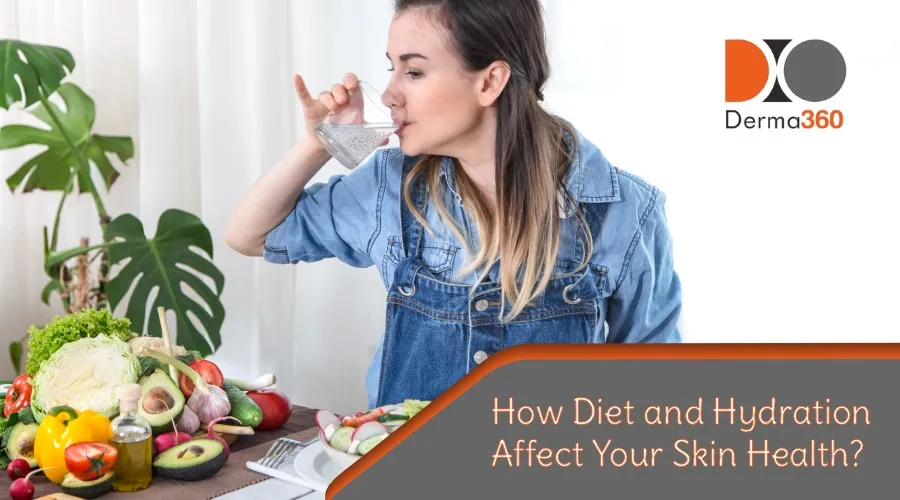Subtotal ₹ 0
It is not only the products that you use on the surface of your skin that define healthy and glowing skin, but it is also much affected by what you consume internally in your body. The food you consume and the quantity of water you take go a long way in ensuring that your skin is elastic or toned. We are going to discuss the role of diet and hydration on your skin and how you can see the difference through changes.
The Skin–Diet Connection
Nutrients from food play a key role in skin tissue healing, oxidative damage prevention, and moisture balance. Inflammation, acne, dull skin, and aging can result from an unbalanced diet high in processed foods, sweets, and unhealthy fats. On the other hand, a balanced diet rich in vitamins, minerals, antioxidants, and good fats supports the skin’s natural regeneration process.
Key Nutrients for Glowing Skin
Vitamin C
Vitamin C is a potent antioxidant that also aids in the production of collagen, a protein that makes your skin tight and young. It prevents the effects of UV damage and counteracts pigmentation. Good sources of Vitamin C include citrus fruits, strawberries, kiwi, and bell peppers.
Vitamin E
Vitamin E is also known as the skin vitamin and is used to neutralize free radicals and oxidative stress. It also improves wound healing and decreases inflammation. Vitamin E is found in nuts, seeds, spinach, and avocados in large quantities.
Omega-3 Fatty Acids
They are also anti-inflammatory and may decrease the flare-up of acne and acne redness. To have smoother skin, add fatty fish such as salmon, chia seeds, walnuts, and flaxseeds to your diet.
Zinc
Zinc also contributes to repairing tissues and helps in balancing oil in the skin. Several foodstuffs, such as pumpkin seeds, lentils, chickpeas, and eggs, contain zinc.
Antioxidants
Foods rich in antioxidants keep your skin safe against any free radicals that are a result of pollution and UV rays. Excellent in promoting youth and radiant skin are the blueberries, green tea, dark chocolate, and leafy greens.
How Hydration Impacts Skin Health?
It aids in the excretion of toxins, the transportation of nutrients, and ensures that your skin cells are well-hydrated and plump. In the long run, chronic lack of water can cause premature wrinkles and loss of elasticity.
Taking water properly will keep the skin moist, which helps protect it against external irritants and pollutants. Having enough water also aids in better blood circulation and leaves your skin with a natural and radiant look.
Among the best rules is drinking a lot of water, about 8-10 glasses per day, which may vary with your activity level, climate, and body type. To boost your hydration level, eat water-rich foods like cucumber, watermelon, oranges, celery, and more.
Foods That Can Harm Your Skin
Some foods improve your skin, but others destroy it.
- Refined sugar raises insulin levels, causing inflammation and the production of oil, which causes acne.
- High levels of trans fats in processed foods have the potential to clog pores, hence dulling the skin.
- In some people, acne has been associated with excessive dairy products, especially skim milk.
- Too much caffeine or alcoholic beverages may contribute to dehydration of the skin, causing the skin to look fatigued and flaky.
Lifestyle and Skincare Balance
The combination of a healthy diet and hydration is effective when combined with good skincare practices and lifestyle choices. Exercise increases blood flow and aids in the transportation of oxygen and nutrients to your skin cells. Sleep will provide your body with time to repair the damaged skin tissues. Stress can also be avoided as a root cause of other stress-related conditions, such as breakouts or eczema, by reducing stress using meditation, yoga, and other relaxing activities.
Although topical creams and treatments are significant in ensuring that it remains in good condition, diet and hydration can give it long-lasting radiance. It is possible to increase the natural shine, strength, and youth of your skin by feeding your body with the necessary proteins and keeping it hydrated.
Keep in mind, beautiful skin is not attained in a day. It is the outcome of regular attention, both indoors and outdoors.



Comments are closed